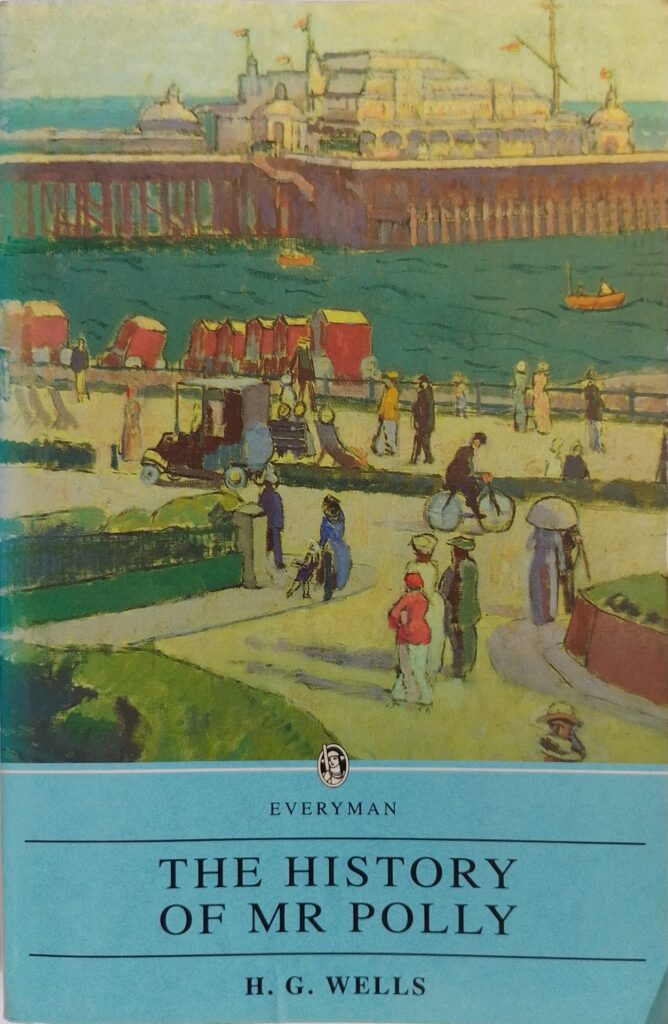First published 1910. Everyman paperback, 2001, pp 235, c.75,000 words.
Aside from Well’s future fiction, this is one of his best-known works. How well does it stand up today? Wells was rather inclined to inject his own views and prejudices into his fiction, although this is perhaps the last of his primarily fiction works according to the laudatory introduction which says: ‘And it is the only book … in which he [Wells] put his art and ideas together in a way that tells us how much more he might have achieved as a novelist if, like Mr. Polly, he had let his imagination master his fears, if he had chosen to describe and understand the humanity of human beings, instead of preaching to them as lost souls.’ [p xxxvii]
To a degree the story is autobiographical in that the main character is from the ‘lower middle class’ [p104] and starts out as an apprentice in a drapery business. There are some excellent passages describing how uninterested Polly is in his work, and the limited pleasure that he gets from spending his time off with some like-minded colleagues. One of Wells main arguments is how bad and wasteful education was for people born in Polly’s circumstances: equipping them for nothing useful. In addition, the social structure has segregated him from the company of female contemporaries, and therefore he has very little sense in understanding and relating to them. Consequently he easily falls into unsuitable relationships, drawn in by a lively mind and physical attraction. All this is very well presented. Even at Polly’s own wedding ‘he would have preferred infinitely a more observant and less prominent role’ [p84]. That sense of a man adrift through life, his actions unplanned and filled with doubt, is realistically evoked.
In the manner of books written in that period, the story is slow to get going. There is a fair amount of authorial moralising: ‘and I’m not certain they were wrong.’ [p12]. Some passages are also rather patronising, particularly as Wells himself came from that same social stratum. At a funeral wake, Polly’s relatives are given yokel accents and rough speech patterns. We are being asked to laugh at their boorish behaviour, and indeed at Polly’s own mangled vocabulary.
There is considerable use of archaic words, but all are readily understandable in context. Some references are more obscure: ‘Revivalists’ was presumably a well know religious movement, ‘Mr. Richard le Gallienne’s very detrimental book, “The Quest of the Golden Girl” ‘ [p54], ‘Mr. Peter Kear, or the late Dr Samuel Smiles … Mr St Loe Strachey.’ [p31] were presumably well-known figures in 1910, and there is a list of authors, perhaps admired by Wells but which Polly has read as an escape from his dull life: ‘La Penrose’, ‘Bart Kennedy’ ‘Lever’, ‘Waterton’, ‘Bates’, etc. amongst other names which are still well known today. [p102]
Two-thirds of the way through the book it suddenly switches into high dramatic gear. Instead of a dull overcast we are now given storm and sunshine. Clouds momentarily darken, but then are blown on to reveal a sunnier spell. This section is altogether much easier reading, even if less plausible. Wells is saying ‘if the world does not please you, you can change it.’ [p137] But is it all to the good? Hasn’t Polly regressed to childhood, finding a protective mother and avoiding responsibility?
This is certainly a period piece with its high moral tone, rigid class structure and sex roles. The injection of author opinion can be patronising and preachy. That said it is an interesting read, and despite the turgid atmosphere of the first two thirds, is fluently and engagingly written. It convinces in being an accurate portrait of what must have been the life of many born into Polly’s circumstances.
Wikipedia biography of Wells: https://en.wikipedia.org/wiki/H._G._Wells
Wikipedia summary of the book: https://en.wikipedia.org/wiki/The_History_of_Mr_Polly
Others’ reviews of the book: https://www.goodreads.com/book/show/483583.The_History_of_Mr_Polly?ref=nav_sb_ss_2_17
© William John Graham, August 2023

